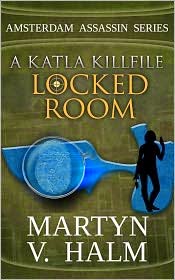I was invited
to join the inaugural IAD, the concept and creation of Debdatta Dasgupta Sahay of b00k
r3vi3ws. On her blog, she posted:
"I was shocked to realize
that there's isn't an International Authors' Day that we can all celebrate to
show our appreciation for the hours of hard work that authors put into
their books... So I decided to do something about it!"[See more at: b00k r3vi3ws]
I immediately hopped on this bandwagon . . . then struggled over which author I’d pimp. So many whom I love. But since I was in the midst of reading the third Amsterdam Assassin Series novel, Rogue, I chose its creator and author, Martyn V. Halm. [You can check out his endlessly entertaining blog here.]
Mr. Halm has created one of the most interesting characters in fiction, the
amazing Katla Sieltjes, the titular Amsterdam Assassin. By dint of a flaw in
her character, Katla lacks a conscience, and so chose freelance assassin as her
career. Hey, why not? Excitement and danger and a lot of killing ensues.
Now, if you
want to know more of Katla, you can read my reviews on Amazon and Goodreads. Well, actually, reading
the books is probably the smarter choice. But about her author . . . well, here
we go:
Mr. Halm lives in Amsterdam with his wife and two kids – to whom he routinely dedicates his work – but don't get confused over this appearance of domesticity. His
background means he has the chops for writing this high-action series. He’s a former
motorcycle courier, so those chase scenes he writes have realistic punch. He trains in koryu bujutsu [an
ancient martial art] and aikido [another martial art, developed
in the early-twentieth century], so the hand-to-hand combat scenes are
authentic and thrilling. He studies the ages-old game of Go, the intricate
strategies of which are evident in the complex development of his plots. Most
scenes are set in Amsterdam, and Mr. Halm’s knowledge of and love for his city
comes through loud and clear.

 The research
that goes into writing Katla – and her blind lover Bram [Mr. Halm's depiction of the blind has been lauded by experts] – is evident, leaving
me chewing my nails for the next one. I know it takes time and effort to write novels
such as these. There are guns and games and gore galore in these works, and
each rings true as a monument to verisimilitude in fiction.
The research
that goes into writing Katla – and her blind lover Bram [Mr. Halm's depiction of the blind has been lauded by experts] – is evident, leaving
me chewing my nails for the next one. I know it takes time and effort to write novels
such as these. There are guns and games and gore galore in these works, and
each rings true as a monument to verisimilitude in fiction.
There are three
full-length novels [Reprobate, Peccadillo, and the above-mentioned Rogue], plus three short works [the Katla KillFiles - Microchip Murder, Fundamental Error, and Locked Room]. Suss them out on Amazon, Kobo, Barnes & Noble, and
wherever else awesome books are sold. FYI, they are also on Scribd, and for the moment on Kobo, Reprobate and the KillFiles are all free! Enjoy.






